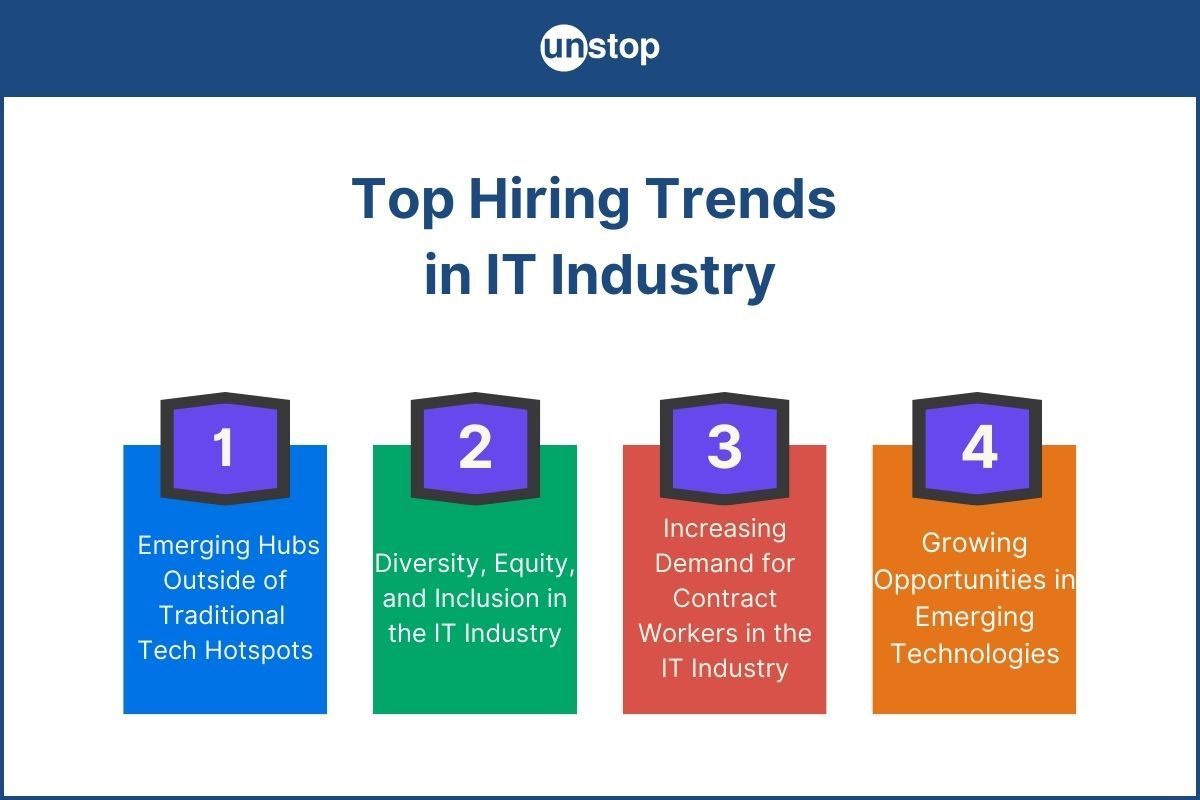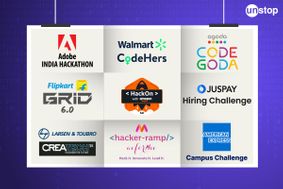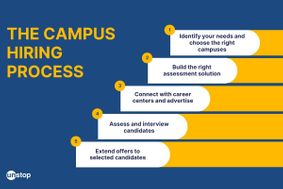- Post-Pandemic Hiring Trends in the IT Industry
- 2023 Hiring Trends in IT Industry
- Tech Job Growth and Emerging Hubs
- Diversity, Equity, and Inclusion in the IT Industry
- Increasing Demand for Contract Workers in IT Industry
- Growing Opportunities in Software Development
- Navigating the Tech Talent Landscape
- Frequently Asked Questions
Hiring Trends In IT Industry In 2025: New Tech Hubs, Contract Work & More

The IT industry is experiencing a significant surge in demand for tech talent across various sectors. As businesses embrace digital transformation, the need for skilled professionals to drive innovation and technological advancements has become paramount. In this fast-paced job market, technology skills have gained immense importance, making them essential for individuals seeking new opportunities.
One notable trend in the hiring process is the shift towards remote work and virtual hiring processes. With companies adapting to the challenges posed by the pandemic, virtual interviews and remote onboarding have become commonplace. This transition has opened up opportunities for candidates regardless of their geographical location, expanding the pool of potential hires.
Moreover, there is a growing emphasis on upskilling and reskilling to meet evolving industry needs, as well as fostering a more diverse and inclusive culture at the workplace that translates into the workforce as well. These trends have impacted how recruitment works across industries, including the world of tech. Let’s dig deeper into the hiring trends in the IT industry:
Post-Pandemic Hiring Trends in the IT Industry
The COVID-19 pandemic has significantly impacted the way companies approach recruiting in the tech industry. As organizations adapt to the new normal, several trends have emerged that are shaping the hiring landscape.
Rise of virtual interviews and remote onboarding
One of the most noticeable changes in recruiting practices is the widespread adoption of online recruitment. With social distancing measures and travel restrictions in place, traditional face-to-face interviews have been replaced by video conferencing tools like Zoom or Microsoft Teams. This shift has not only allowed companies to continue their recruitment processes uninterrupted but also opened up opportunities for candidates from different geographical locations.
Remote onboarding has become crucial as well, with new hires joining teams without physically setting foot in an office environment. Companies have had to devise creative ways to make sure employees feel welcomed and integrated into their roles remotely. Virtual orientation sessions, online training modules, and assigning mentors have become common practices to ensure a smooth transition for new hires.
Unstop can help you streamline your remote hiring process and make it more efficient. Explore more here.
Focus on candidate experience through personalized interactions
In a highly competitive job market, providing an exceptional candidate experience has become paramount for attracting top talent. Employers now understand that personalization plays a pivotal role in making candidates feel valued throughout the recruiting process. From tailored job descriptions to personalized communication, recruiters are going above and beyond to create meaningful connections with potential hires.
Companies are leveraging technology to enhance candidate experience further. Automated messaging systems allow recruiters to provide timely updates and feedback while maintaining a human touch. Social media platforms also play a significant role in engaging with candidates directly and showcasing company culture.
Adoption of AI-powered tools for efficient screening and selection
To streamline their recruiting processes, many organizations are embracing AI-powered tools for screening resumes and selecting qualified candidates efficiently. These tools use algorithms to analyze resumes based on specific criteria, such as skills, experience, and qualifications. By automating the initial screening stage, recruiters can save time and focus on more strategic aspects of the hiring process.
AI-powered chatbots have also gained popularity in engaging with candidates and answering frequently asked questions. These virtual assistants provide instant responses and ensure a seamless candidate experience by eliminating delays in communication.
Increased reliance on data-driven decision-making in recruitment
Data-driven decision-making has become a cornerstone of modern recruitment practices. Companies are leveraging analytics to gain insights into their hiring processes and make informed decisions. By analyzing data from various sources like applicant tracking systems, job boards, and social media platforms, recruiters can identify patterns and trends that help them refine their strategies.

2024 Hiring Trends in IT Industry

The lingering effects of the pandemic have shaped the way recruitment functions in the IT industry. Here are the top hiring trends in IT industry:
i) Tech Job Growth and Emerging Hubs Outside of Traditional Tech Hotspots
ii) Diversity, Equity, and Inclusion in the IT Industry
iii) Increasing Demand for Contract Workers in the IT Industry
iv) Growing Opportunities in Emerging Technologies like Cloud Computing, Cybersecurity, etc.
Let’s study these trends in detail:
Tech Job Growth and Emerging Hubs
The IT industry has experienced significant growth in tech job opportunities globally. As technology continues to advance at a rapid pace, the demand for skilled professionals in various tech fields has skyrocketed. This surge in job growth has led to the emergence of new tech hubs beyond traditional locations, creating exciting opportunities for both employers and job seekers.
One of the key factors driving this expansion is the high demand for professionals skilled in cloud computing, cybersecurity, and artificial intelligence (AI).
As businesses increasingly rely on these technologies to stay competitive in today's digital landscape, the need for experts proficient in these areas has become paramount. Companies are actively seeking individuals who can develop innovative solutions, protect sensitive data from cyber threats, and harness the power of AI to drive business growth.
Moreover, technology companies are no longer confined to specific regions or cities. They are expanding into diverse regions to tap into local talent pools and take advantage of favorable economic conditions. This expansion not only helps companies find skilled professionals but also contributes to job market growth in those areas. As a result, emerging tech hubs have been established worldwide, offering exciting career prospects outside of traditional tech hotspots.
In this competitive job market, remote work has gained prominence as an attractive option for both employers and employees. With advancements in communication technology and widespread internet access, remote jobs have become more feasible than ever before. Many tech companies now offer remote work options or flexible hybrid work models that combine office-based work with remote arrangements.
To connect employers with potential candidates and facilitate networking within the industry, various networking events are organized regularly. These events provide a platform for professionals to showcase their skills and make valuable connections with industry leaders. Attending such events can be instrumental in finding new job opportunities or advancing one's career within the IT industry.
There is a wide range of options available. From entry-level jobs that require foundational knowledge to specialized roles that demand advanced expertise, individuals with varying skill levels can find suitable positions. Job posts and job postings across different platforms offer a glimpse into the diverse array of opportunities available in the tech job market.
Diversity, Equity, and Inclusion in the IT Industry
In recent years, there has been an increasing focus on diversity initiatives within tech organizations. Recognizing the importance of diverse teams, companies are actively seeking ways to create a more inclusive environment in the IT industry. This shift is not only driven by ethical considerations but also by the understanding that diversity brings numerous benefits to businesses.
One of the key aspects of promoting diversity is through the implementation of inclusive hiring practices. Tech organizations are now placing greater emphasis on ensuring equity throughout their recruitment processes. Rather than solely focusing on technical skills or cultural fit, companies are striving to create a level playing field for all candidates. By removing bias from hiring decisions and considering a wider range of backgrounds and experiences, organizations can tap into a more diverse talent pool.
Efforts to bridge the gender and racial gap in tech employment have become a priority for many companies. Historically, these fields have been predominantly male-dominated, and underrepresented groups such as women and minorities have faced barriers to entry. However, with increased awareness and advocacy for diversity in tech, organizations are actively working towards creating equal opportunities for all individuals regardless of their gender or race.
Diverse teams have proven to have a positive impact on innovation within organizations. When people from different backgrounds come together, they bring unique perspectives that can lead to creative problem-solving and fresh ideas. Research has shown that hiring trends in the IT industry indicate that diverse teams tend to outperform homogeneous ones. By fostering an inclusive culture where everyone feels valued and heard, tech companies can harness this potential for innovation.
To achieve true diversity, equity, and inclusion (DEI) in the IT industry, organizations need to foster empathy within their workforce. It's crucial for employees at all levels to understand the challenges faced by underrepresented groups and actively work towards creating an environment where everyone feels welcome and supported. DEI should be integrated into business strategies rather than treated as an isolated initiative. By embedding diversity and inclusion into the core values of an organization, it becomes a shared responsibility and not just a checkbox exercise.
Find out here how Walmart exceeded its gender mandates through a unique diversity hackathon.
Female Representation in Tech Applicant Pools and Organic Sources
Encouraging more women to pursue careers in technology fields is crucial for bridging the employment gender gap and fostering diversity within the IT industry. To achieve this, promoting STEM education among girls from an early age becomes essential. Collaboration with organizations that support the advancement of female technologists can significantly contribute to increasing female representation in tech applicant pools.
Promoting STEM Education Among Girls
Promoting STEM education among girls from an early age is a proactive approach to cultivating interest and nurturing talent in technology-related fields. By providing opportunities for girls to engage with science, technology, engineering, and mathematics, we can inspire their curiosity and encourage them to consider pursuing careers in IT.
To accomplish this goal, educational institutions should implement programs that expose young girls to coding workshops, robotics competitions, and other hands-on activities. This exposure helps break down gender stereotypes surrounding technical fields while empowering girls with the skills necessary for success in the digital era.
Furthermore, mentorship programs connecting aspiring female technologists with successful women already working in the industry can provide valuable guidance and support. These mentors can share their experiences, offer advice on career paths, and serve as role models for young girls considering a future in technology.
Collaboration with Organizations Supporting Female Technologists' Advancement
Collaborating with organizations dedicated to supporting female technologists' advancement plays a significant role in increasing female representation within tech applicant pools. These organizations often provide resources such as networking opportunities, professional development workshops, and scholarships specifically tailored to women pursuing careers in IT.
Increasing Demand for Contract Workers in IT Industry
The IT industry is witnessing a significant shift in hiring trends, with an increasing demand for contract workers. This growing preference for contract-based employment arrangements by employers is driven by several factors that benefit both companies and job seekers.
One of the key reasons behind the rise in demand for contract workers is the flexibility offered by these roles. Companies can bring in specialized skills temporarily to meet their business needs without committing to long-term employment contracts. This flexibility allows them to adapt quickly to changing market conditions and project requirements. For example, during peak periods or when faced with tight deadlines, companies can hire contract workers who possess specific expertise to ensure timely completion of projects.
Moreover, the cost-effectiveness of hiring contract workers has contributed to their popularity among employers. By hiring contingent workers, companies can avoid the expenses associated with full-time employees such as benefits, training, and overhead costs. Instead, they can allocate resources more efficiently by engaging contract workers on an as-needed basis. This approach not only helps businesses save money but also enables them to access a broader talent pool that may have otherwise been out of reach due to budget constraints.
The rise of the gig economy has also played a significant role in driving the demand for contract work in the IT industry. With advancements in technology and increased connectivity, many professionals are embracing freelance opportunities and seeking flexible work arrangements. The gig economy provides job seekers with greater control over their careers and allows them to choose projects that align with their skills and interests. As a result, companies looking to hire top talent are increasingly turning towards this pool of highly skilled independent contractors.
In addition to benefiting employers, contract work offers advantages for certain job seekers as well. Professionals who prefer variety in their work or seek exposure to different industries find contract roles appealing. These positions allow individuals to gain diverse experiences while expanding their skill sets across various projects and organizations.
Growing Opportunities for Technology Talent in Software Development
The software development sector is experiencing rapid growth, creating a plethora of job prospects for individuals seeking opportunities in the tech industry. With the increasing reliance on technology across various industries, tech companies are constantly on the lookout for skilled professionals to fill roles in software development.
One of the key demands in this field is for full-stack developers who possess proficiency across multiple programming languages. As businesses strive to create robust and versatile applications, they require developers who can seamlessly navigate both front-end and back-end development. Full-stack developers are sought after because they have a comprehensive understanding of various technologies, enabling them to tackle complex projects efficiently.
Furthermore, emerging technologies such as blockchain and IoT present exciting avenues for career growth in software development. These cutting-edge innovations offer unique challenges that require specialized skills. Tech professionals with expertise in these areas can capitalize on the opportunities arising from their implementation across different industries. By staying up-to-date with the latest trends and acquiring relevant skills, individuals can position themselves as valuable assets within the talent market.
Another area where there is a growing need for expertise is cloud-based solutions. As organizations increasingly adopt cloud computing to enhance efficiency and scalability, there is a rising demand for software engineers well-versed in cloud platforms such as Amazon Web Services (AWS), Microsoft Azure, and Google Cloud Platform (GCP). These professionals play a crucial role in developing and maintaining cloud-based applications that enable businesses to leverage the benefits of remote data storage, seamless collaboration, and scalable infrastructure.
Moreover, cybersecurity has become a top priority for organizations, given the increasing frequency and sophistication of cyber threats. As a result, there is a growing demand for professionals skilled in cybersecurity practices and technologies. Individuals with expertise in this field can explore various job opportunities, ranging from ethical hacking to security analysis and risk assessment.
In addition to technical skills, soft skills also play an essential role in securing employment within the IT industry. While possessing strong programming abilities is important, employers often seek individuals who can effectively communicate ideas, work collaboratively in teams, and adapt quickly to changing circumstances. Soft skills like problem-solving, critical thinking, and creativity are highly valued by employers as they contribute to overall team dynamics and project success.
Navigating the Tech Talent Landscape for Software Developers
In today's competitive IT industry, staying ahead of the hiring trends is crucial for both employers and job seekers. As businesses increasingly rely on technology, the demand for top tech talent continues to rise. To navigate this ever-evolving landscape successfully, software developers must employ various strategies to showcase their skills and connect with potential employers.
Utilizing Online Platforms to Showcase Skills and Connect with Potential Employers
One effective way for developers to stand out in a crowded talent pool is by utilizing online platforms that allow them to showcase their skills and connect directly with potential employers. Websites like GitHub, GitLab, and Stack Overflow provide opportunities to build an impressive portfolio of projects, contribute to open-source initiatives, and engage in meaningful discussions within the developer community.
By actively participating in these platforms, developers not only demonstrate their technical proficiency but also establish a professional online presence that can catch the attention of hiring managers. These platforms often host job boards where companies frequently post openings specifically targeting tech professionals.
Engaging in Open-Source Projects to Gain Practical Experience
Another valuable strategy for software developers looking to enhance their skill sets and gain practical experience is engaging in open-source projects. Contributing code or collaborating on well-known open-source initiatives allows developers to work alongside experienced professionals while tackling real-world challenges.
Open-source projects provide an opportunity for developers to expand their knowledge base, refine their coding techniques, and familiarize themselves with different tools and technologies. It also demonstrates a commitment to continuous learning and showcases their ability to work effectively within teams.
Networking Within Tech Communities to Explore Job Opportunities
Networking plays a significant role in the IT industry. Developers who actively engage with fellow professionals within tech communities increase their chances of discovering new roles before they are publicly advertised.
Attending industry conferences, meetups, or joining online forums dedicated to specific programming languages or frameworks can lead to meaningful connections with potential employers. By establishing relationships and demonstrating their expertise, developers may find themselves on the radar of hiring managers seeking top tech talent.
Leveraging Coding Bootcamps and Online Courses for Skill Enhancement
To keep pace with the ever-evolving tech landscape, software developers should consider leveraging coding bootcamps and online courses. These intensive training programs provide a structured learning environment where developers can acquire new skills or deepen their existing ones in a relatively short period.
Coding bootcamps often focus on specific technologies or programming languages, allowing developers to become proficient in high-demand areas quickly. Online courses offer flexibility, enabling professionals to learn at their own pace while balancing work and personal life commitments.
In 2024, it is crucial for both employers and job seekers to stay informed about the hiring trends in IT industry to make strategic decisions. Organizations should prioritize diversity and inclusion efforts to tap into a wider pool of talent. Job seekers should focus on acquiring skills relevant to emerging technologies and consider contract work as a viable option.
Frequently Asked Questions
1. How can I improve my chances of landing a top software developer job?
To improve your chances of landing a top software developer job, it is essential to continually enhance your skills and stay updated with the latest technologies. Participate in coding bootcamps or online courses that offer hands-on experience with popular programming languages. Building a strong portfolio showcasing your projects can greatly impress potential employers.
2. What are some emerging technology trends that software developers should be aware of?
Software developers should keep an eye on emerging technology trends such as artificial intelligence (AI), machine learning (ML), blockchain, Internet of Things (IoT), cloud computing, cybersecurity, and augmented reality/virtual reality (AR/VR). These technologies are rapidly shaping various industries and having knowledge or experience in them can make you more valuable as a software developer.
3. Are there any specific skills that are in high demand for software developers?
Yes, several skills are in high demand for software developers. Some of these include proficiency in programming languages like Python, Java, JavaScript, and C#. Skills in web development frameworks (such as React or Angular), database management systems (such as SQL or MongoDB), and cloud computing platforms (such as AWS or Azure) are highly sought after.
4. What steps can organizations take to promote diversity and inclusion in the IT industry?
One of the top hiring trends in the IT industry is diversity and Inclusion. Organizations can promote diversity and inclusion by implementing unbiased hiring practices, providing equal opportunities for career growth and advancement, fostering inclusive company cultures, offering mentorship programs for underrepresented groups, and actively supporting employee resource groups focused on diversity. By creating an inclusive environment where diverse perspectives are valued and celebrated, organizations can attract top talent from all backgrounds.
You may also be interested in:
- How To Hire Programmers: 4 Easy Steps To Find The Right Talent In 2024
- Recruitment Process Flowchart: Step-by-Step Guide On How To Make One With Examples
- Sourcing in Recruitment: A Comprehensive Guide Including Tips & Tactics
- Screening In Recruitment: Understand Its Stages, Methods & More
- A Detailed Approach To Developing A Winning Recruitment Strategy
I’m a reader first and a writer second, constantly diving into the world of content. If I’m not writing or reading, I like watching movies and dreaming of a life by the beach.
Login to continue reading
And access exclusive content, personalized recommendations, and career-boosting opportunities.
Subscribe
to our newsletter
Blogs you need to hog!

Organize Hackathons: The Ultimate Playbook With Past Case Studies

What is Campus Recruitment? How To Tap The Untapped Talent?

Lateral Hiring: A Complete Guide To The Process, Its Benefits, Challenges & Best Practices









Comments
Add comment